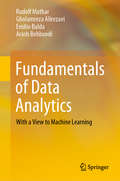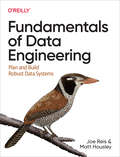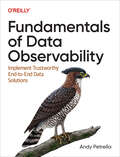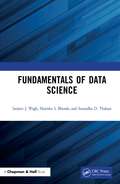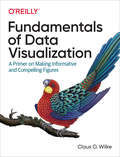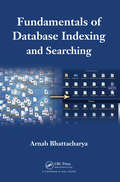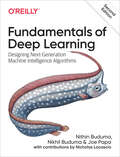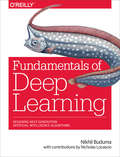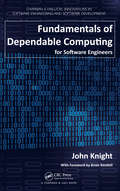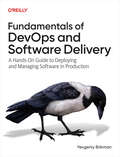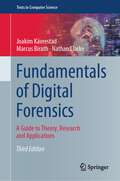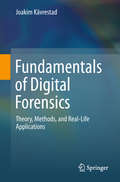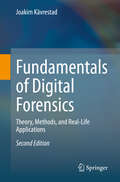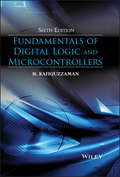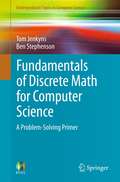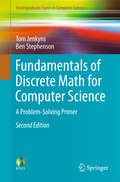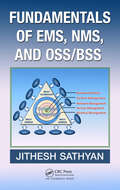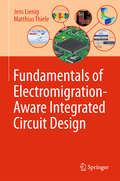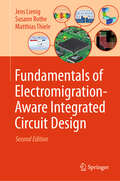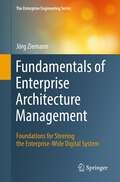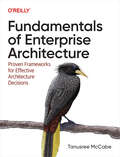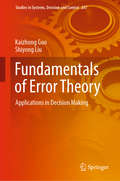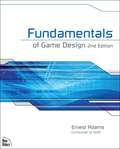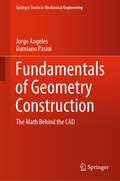- Table View
- List View
Fundamentals of Data Analytics: With a View to Machine Learning
by Rudolf Mathar Gholamreza Alirezaei Emilio Balda Arash BehboodiThis book introduces the basic methodologies for successful data analytics. Matrix optimization and approximation are explained in detail and extensively applied to dimensionality reduction by principal component analysis and multidimensional scaling. Diffusion maps and spectral clustering are derived as powerful tools. The methodological overlap between data science and machine learning is emphasized by demonstrating how data science is used for classification as well as supervised and unsupervised learning.
Fundamentals of Data Engineering: Plan and Build Robust Data Systems
by Joe Reis Matt HousleyData engineering has grown rapidly in the past decade, leaving many software engineers, data scientists, and analysts looking for a comprehensive view of this practice. With this practical book, you'll learn how to plan and build systems to serve the needs of your organization and customers by evaluating the best technologies available through the framework of the data engineering lifecycle. Authors Joe Reis and Matt Housley walk you through the data engineering lifecycle and show you how to stitch together a variety of cloud technologies to serve the needs of downstream data consumers. You'll understand how to apply the concepts of data generation, ingestion, orchestration, transformation, storage, and governance that are critical in any data environment regardless of the underlying technology. This book will help you: Get a concise overview of the entire data engineering landscapeAssess data engineering problems using an end-to-end framework of best practicesCut through marketing hype when choosing data technologies, architecture, and processesUse the data engineering lifecycle to design and build a robust architectureIncorporate data governance and security across the data engineering lifecycle
Fundamentals of Data Observability: Implement Trustworthy End-to-End Data Solutions
by Andy PetrellaQuickly detect, troubleshoot, and prevent a wide range of data issues through data observability, a set of best practices that enables data teams to gain greater visibility of data and its usage. If you're a data engineer, data architect, or machine learning engineer who depends on the quality of your data, this book shows you how to focus on the practical aspects of introducing data observability in your everyday work. Author Andy Petrella helps you build the right habits to identify and solve data issues, such as data drifts and poor quality, so you can stop their propagation in data applications, pipelines, and analytics. You'll learn ways to introduce data observability, including setting up a framework for generating and collecting all the information you need. Learn the core principles and benefits of data observabilityUse data observability to detect, troubleshoot, and prevent data issuesFollow the book's recipes to implement observability in your data projectsUse data observability to create a trustworthy communication framework with data consumersLearn how to educate your peers about the benefits of data observability
Fundamentals of Data Science
by Sanjeev J. Wagh Manisha S. Bhende Anuradha D. ThakareFundamentals of Data Science is designed for students, academicians and practitioners with a complete walkthrough right from the foundational groundwork required to outlining all the concepts, techniques and tools required to understand Data Science. Data Science is an umbrella term for the non-traditional techniques and technologies that are required to collect, aggregate, process, and gain insights from massive datasets. This book offers all the processes, methodologies, various steps like data acquisition, pre-process, mining, prediction, and visualization tools for extracting insights from vast amounts of data by the use of various scientific methods, algorithms, and processes Readers will learn the steps necessary to create the application with SQl, NoSQL, Python, R, Matlab, Octave and Tablue. This book provides a stepwise approach to building solutions to data science applications right from understanding the fundamentals, performing data analytics to writing source code. All the concepts are discussed in simple English to help the community to become Data Scientist without much pre-requisite knowledge. Features : Simple strategies for developing statistical models that analyze data and detect patterns, trends, and relationships in data sets. Complete roadmap to Data Science approach with dedicatedsections which includes Fundamentals, Methodology and Tools. Focussed approach for learning and practice various Data Science Toolswith Sample code and examples for practice. Information is presented in an accessible way for students, researchers and academicians and professionals.
Fundamentals of Data Visualization: A Primer on Making Informative and Compelling Figures
by Claus O. WilkeEffective visualization is the best way to communicate information from the increasingly large and complex datasets in the natural and social sciences. But with the increasing power of visualization software today, scientists, engineers, and business analysts often have to navigate a bewildering array of visualization choices and options.This practical book takes you through many commonly encountered visualization problems, and it provides guidelines on how to turn large datasets into clear and compelling figures. What visualization type is best for the story you want to tell? How do you make informative figures that are visually pleasing? Author Claus O. Wilke teaches you the elements most critical to successful data visualization.Explore the basic concepts of color as a tool to highlight, distinguish, or represent a valueUnderstand the importance of redundant coding to ensure you provide key information in multiple waysUse the book’s visualizations directory, a graphical guide to commonly used types of data visualizationsGet extensive examples of good and bad figuresLearn how to use figures in a document or report and how employ them effectively to tell a compelling story
Fundamentals of Database Indexing and Searching
by Arnab BhattacharyaFundamentals of Database Indexing and Searching presents well-known database searching and indexing techniques. It focuses on similarity search queries, showing how to use distance functions to measure the notion of dissimilarity.After defining database queries and similarity search queries, the book organizes the most common and representative ind
Fundamentals of Deep Learning: Designing Next-Generation Machine Intelligence Algorithms
by Nikhil Buduma Joe Papa Nithin BudumaWe're in the midst of an AI research explosion. Deep learning has unlocked superhuman perception to power our push toward creating self-driving vehicles, defeating human experts at a variety of difficult games including Go, and even generating essays with shockingly coherent prose. But deciphering these breakthroughs often takes a PhD in machine learning and mathematics.The updated second edition of this book describes the intuition behind these innovations without jargon or complexity. Python-proficient programmers, software engineering professionals, and computer science majors will be able to reimplement these breakthroughs on their own and reason about them with a level of sophistication that rivals some of the best developers in the field.Learn the mathematics behind machine learning jargonExamine the foundations of machine learning and neural networksManage problems that arise as you begin to make networks deeperBuild neural networks that analyze complex imagesPerform effective dimensionality reduction using autoencodersDive deep into sequence analysis to examine languageExplore methods in interpreting complex machine learning modelsGain theoretical and practical knowledge on generative modelingUnderstand the fundamentals of reinforcement learning
Fundamentals of Deep Learning: Designing Next-Generation Machine Intelligence Algorithms
by Nicholas Locascio Nikhil BudumaWith the reinvigoration of neural networks in the 2000s, deep learning has become an extremely active area of research that is paving the way for modern machine learning. This book uses exposition and examples to help you understand major concepts in this complicated field.Large companies such as Google, Microsoft, and Facebook have taken notice, and are actively growing in-house deep learning teams. For the rest of us however, deep learning is still a pretty complex and difficult subject to grasp. If you have a basic understanding of what machine learning is, have familiarity with the Python programming language, and have some mathematical background with calculus, this book will help you get started.
Fundamentals of Dependable Computing for Software Engineers (Chapman And Hall/crc Innovations In Software Engineering And Software Development Ser.)
by John KnightFundamentals of Dependable Computing for Software Engineers presents the essential elements of computer system dependability. The book describes a comprehensive dependability-engineering process and explains the roles of software and software engineers in computer system dependability. Readers will learn:Why dependability mattersWhat it means for a
Fundamentals of DevOps and Software Delivery
by Yevgeniy BrikmanThis book is a guide to DevOps and software delivery: that is, a guide to the numerous tools and techniques that are required to take that application code and run it and maintain it in production, where it can generate value for your users and your company on an ongoing basis. This includes going through all the modern practices for deploying applications and microservices to the cloud, managing your infrastructure as code, automating your software delivery lifecycle in a CI/CD pipeline, configuring networking, setting up data stores, and hooking up monitoring.
Fundamentals of Digital Forensics: A Guide to Theory, Research and Applications (Texts in Computer Science)
by Nathan Clarke Joakim Kävrestad Marcus BirathThis textbook describes the theory and methodology of digital forensic examinations, presenting examples developed in collaboration with police authorities to ensure relevance to real-world practice. The coverage includes discussions on forensic artifacts and constraints, as well as forensic tools used for law enforcement and in the corporate sector. Emphasis is placed on reinforcing sound forensic thinking, and gaining experience in common tasks through hands-on exercises.This enhanced third edition describes practical digital forensics with open-source tools and includes an outline of current challenges and research directions.Topics and features:Outlines what computer forensics is, and what it can do, as well as what its limitations areDiscusses both the theoretical foundations and the fundamentals of forensic methodologyReviews broad principles that are applicable worldwideExplains how to find and interpret several important artifactsDescribes free and open-source software toolsFeatures content on corporate forensics, ethics, SQLite databases, triage, and memory analysisIncludes new supporting video lectures on YouTubeThis easy-to-follow primer is an essential resource for students of computer forensics, and will also serve as a valuable reference for practitioners seeking instruction on performing forensic examinations.
Fundamentals of Digital Forensics: Theory, Methods, and Real-Life Applications
by Joakim KävrestadThis hands-on textbook provides an accessible introduction to the fundamentals of digital forensics. The text contains thorough coverage of the theoretical foundations, explaining what computer forensics is, what it can do, and also what it can’t. A particular focus is presented on establishing sound forensic thinking and methodology, supported by practical guidance on performing typical tasks and using common forensic tools. Emphasis is also placed on universal principles, as opposed to content unique to specific legislation in individual countries.Topics and features: introduces the fundamental concepts in digital forensics, and the steps involved in a forensic examination in a digital environment; discusses the nature of what cybercrime is, and how digital evidence can be of use during criminal investigations into such crimes; offers a practical overview of common practices for cracking encrypted data; reviews key artifacts that have proven to be important in several cases, highlighting where to find these and how to correctly interpret them; presents a survey of various different search techniques, and several forensic tools that are available for free; examines the functions of AccessData Forensic Toolkit and Registry Viewer; proposes methods for analyzing applications, timelining, determining the identity of the computer user, and deducing if the computer was remote controlled; describes the central concepts relating to computer memory management, and how to perform different types of memory analysis using the open source tool Volatility; provides review questions and practice tasks at the end of most chapters, and supporting video lectures on YouTube.This easy-to-follow primer is an essential resource for students of computer forensics, and will also serve as a valuable reference for practitioners seeking instruction on performing forensic examinations in law enforcement or in the private sector.
Fundamentals of Digital Forensics: Theory, Methods, and Real-Life Applications
by Joakim KävrestadThis practical and accessible textbook/reference describes the theory and methodology of digital forensic examinations, presenting examples developed in collaboration with police authorities to ensure relevance to real-world practice. The coverage includes discussions on forensic artifacts and constraints, as well as forensic tools used for law enforcement and in the corporate sector. Emphasis is placed on reinforcing sound forensic thinking, and gaining experience in common tasks through hands-on exercises.This enhanced second edition has been expanded with new material on incident response tasks and computer memory analysis.Topics and features:Outlines what computer forensics is, and what it can do, as well as what its limitations areDiscusses both the theoretical foundations and the fundamentals of forensic methodologyReviews broad principles that are applicable worldwideExplains how to find and interpret several important artifactsDescribes free and open source software tools, along with the AccessData Forensic ToolkitFeatures exercises and review questions throughout, with solutions provided in the appendicesIncludes numerous practical examples, and provides supporting video lectures onlineThis easy-to-follow primer is an essential resource for students of computer forensics, and will also serve as a valuable reference for practitioners seeking instruction on performing forensic examinations.Joakim Kävrestad is a lecturer and researcher at the University of Skövde, Sweden, and an AccessData Certified Examiner. He also serves as a forensic consultant, with several years of experience as a forensic expert with the Swedish police.
Fundamentals of Digital Logic and Microcontrollers
by M. RafiquzzamanReviews of the Fifth Edition:"...a well-established text for undergraduate and graduate students...a good reference for engineers." (IEEE Circuits & Devices Magazine, November/December 2006)"...will serve very well for a number of courses in electrical and computing engineering...can also be used as a reference by practicing engineers who want to know about microcomputers." (Computing Reviews.com, December 14, 2005)"Long recognized for its clear and simple presentation of the principles and basic tools required to design typical digital systems..." (IEEE Computer Magazine, August 2005)While technological change advancing at such a rapid pace, it should come as no surprise that microcontrollers are playing an increasingly important role in the design of digital systems. An understanding of the basic principles of microcontrollers is just one of the enhancements featured in the 6th Edition of Fundamentals of Digital Logic and Microcontrollers. Widely praised by both students and experts alike for its clear and simple presentation of the basic principles and necessary tools required to design typical digital systems, this new edition is entirely updated and revised to reflect the latest advances in contemporary digital design. The text's primary focus remains on computer design at the device, logic, and system levels while covering such basic points as number systems and Boolean algebra, combinational and sequential logic design. More advanced topics such as computer architecture and microcontroller-based applications are also addressed. Simplified coverage of basic concepts associated with CPLDs and FPGAs is included. Fundamentals of Digital Logic and Microcontrollers, 6th Edition, solidifies its reputation as the most invaluable and accessible introduction to the principles of digital system design available today.Numerous examples are provided throughout the text, including a complete tutorial for compiling and debugging a C-Program using the MPLAB. A solutions manual is available to instructors who adopt this text for a university course.
Fundamentals of Digital Manufacturing Science
by Dejun Chen Shane Shengquan Xie Zude ZhouThe manufacturing industry will reap significant benefits from encouraging the development of digital manufacturing science and technology. Digital Manufacturing Science uses theorems, illustrations and tables to introduce the definition, theory architecture, main content, and key technologies of digital manufacturing science. Readers will be able to develop an in-depth understanding of the emergence and the development, the theoretical background, and the techniques and methods of digital manufacturing science. Furthermore, they will also be able to use the basic theories and key technologies described in Digital Manufacturing Science to solve practical engineering problems in modern manufacturing processes. Digital Manufacturing Science is aimed at advanced undergraduate and postgraduate students, academic researchers and researchers in the manufacturing industry. It allows readers to integrate the theories and technologies described with their own research works, and to propose new ideas and new methods to improve the theory and application of digital manufacturing science.
Fundamentals of Discrete Math for Computer Science
by Tom Jenkyns Ben StephensonThis textbook provides an engaging and motivational introduction to traditional topics in discrete mathematics, in a manner specifically designed to appeal to computer science students. The text empowers students to think critically, to be effective problem solvers, to integrate theory and practice, and to recognize the importance of abstraction. Clearly structured and interactive in nature, the book presents detailed walkthroughs of several algorithms, stimulating a conversation with the reader through informal commentary and provocative questions. Features: no university-level background in mathematics required; ideally structured for classroom-use and self-study, with modular chapters following ACM curriculum recommendations; describes mathematical processes in an algorithmic manner; contains examples and exercises throughout the text, and highlights the most important concepts in each section; selects examples that demonstrate a practical use for the concept in question.
Fundamentals of Discrete Math for Computer Science: A Problem-solving Primer (Undergraduate Topics in Computer Science)
by Tom Jenkyns Ben StephensonThis clearly written textbook presents an accessible introduction to discrete mathematics for computer science students, offering the reader an enjoyable and stimulating path to improve their programming competence. The text empowers students to think critically, to be effective problem solvers, to integrate theory and practice, and to recognize the importance of abstraction. Its motivational and interactive style provokes a conversation with the reader through a questioning commentary, and supplies detailed walkthroughs of several algorithms.This updated and enhanced new edition also includes new material on directed graphs, and on drawing and coloring graphs, in addition to more than 100 new exercises (with solutions to selected exercises).Topics and features: assumes no prior mathematical knowledge, and discusses concepts in programming as and when they are needed; designed for both classroom use and self-study, presenting modular and self-contained chapters that follow ACM curriculum recommendations; describes mathematical processes in an algorithmic manner, often supported by a walkthrough demonstrating how the algorithm performs the desired task; includes an extensive set of exercises throughout the text, together with numerous examples, and shaded boxes highlighting key concepts; selects examples that demonstrate a practical use for the concept in question.Students embarking on the start of their studies of computer science will find this book to be an easy-to-understand and fun-to-read primer, ideal for use in a mathematics course taken concurrently with their first programming course.
Fundamentals of EMS, NMS and OSS/BSS
by Jithesh SathyanIn this era where data and voice services are available at a push of a button, service providers have virtually limitless options for reaching their customers with value-added services. The changes in services and underlying networks that this always-on culture creates make it essential for service providers to understand the evolving business logi
Fundamentals of Electromigration-Aware Integrated Circuit Design
by Jens Lienig Matthias ThieleThe book provides a comprehensive overview of electromigration and its effects on the reliability of electronic circuits. It introduces the physical process of electromigration, which gives the reader the requisite understanding and knowledge for adopting appropriate counter measures. A comprehensive set of options is presented for modifying the present IC design methodology to prevent electromigration. Finally, the authors show how specific effects can be exploited in present and future technologies to reduce electromigration’s negative impact on circuit reliability.
Fundamentals of Electromigration-Aware Integrated Circuit Design
by Jens Lienig Matthias Thiele Susann RotheThe book provides a comprehensive overview of electromigration and its effects on the reliability of electronic circuits. This second edition has been updated to introduce recent advancements in the understanding of the physical process of electromigration, which gives the reader the knowledge for adopting appropriate counter measures. A comprehensive set of options is presented for modifying the present IC design methodology to prevent electromigration. Finally, the authors show how specific effects can be exploited in present and future technologies to reduce electromigration’s negative impact on circuit reliability.
Fundamentals of Enterprise Architecture Management: Foundations for Steering the Enterprise-Wide Digital System (The Enterprise Engineering Series)
by Jörg ZiemannThis textbook provides a comprehensive, holistic, scientifically precise, and practically relevant description of Enterprise Architecture Management (EAM). Based on state-of-the-art concepts, it also addresses current trends like disruptive digitization or agile methods. The book is structured in five chapters. The first chapter offers a comprehensive overview of EAM. It addresses questions like: what does EAM mean, what is the history of EAM, why do enterprises need EAM, what are its goals, and how is it related to digitalization? It also includes a short overview of essential EAM standards and literature. The second chapter provides an overview of Enterprise Architecture (EA). It starts with clarifying basic terminology and the difference between EA and EAM. It also gives a short summary of existing EA frameworks and methods for structuring the digital ecosystem into layers and views. The third chapter addresses the strategic and tactical context of the EAM capability in an enterprise. It defines essential terms and parameters in the context of enterprise strategy and tactics as well as the operative, organizational context of EAM. The fourth chapter specifies the detailed goals, processes, functions, artifacts, roles and tools of EAM, building the basis for an EAM process framework that provides a comprehensive overview of EAM processes and functions. Closing the circle, the last chapter describes how to evaluate EAM in an enterprise. It starts by laying out core terminology, like “metric” and “strategic performance measurement system” and ends with a framework that integrates the various measuring areas in the context of EA and EAM. This textbook focuses on two groups: First, EAM scholars, ie bachelor or master students of Business Information Systems, Business Administration or Computer Science. And second, EAM practitioners working in the field of IT strategy or EA who need a reliable, scientifically solid, and practically proven state-of-the-art description of essential EAM methods.
Fundamentals of Enterprise Architecture: Proven Frameworks for Effective Architecture Decisions
by Tanu McCabeWith the increasing complexity of modern cloud-based systems, an effective enterprise architecture program is more critical than ever. In this practical book, author Tanu McCabe from Capital One provides proven frameworks and practices to define an effective enterprise architecture strategy—one that will enable software and enterprise architects to create and implement great architecture strategies.You'll learn how to create shared alignment across business and technology, embed architecture practices into processes and tooling, incorporate technology and business trends, and instill contextual understanding over siloed decision-making. Complete with examples of patterns and antipatterns, this book provides reusable templates, assessment tools, and practical advice.With this book, you will:Understand exactly what enterprise architecture is, and why it's important to build an effective enterprise architecture practiceLearn who needs to be involved to define and implement architecture strategiesExamine common pitfalls that inhibit effective architecture strategiesAssess the current state of your organization's architecture practice to identify opportunities for improvementDefine your own architecture strategy at both an organizational and personal level by applying the book's frameworksEnhance your ability to make great architecture decisions using the frameworks and lessons providedTanusree (Tanu) McCabe is a distinguished engineer who leads public cloud strategy at CVS and formerly led enterprise architecture strategy at Capital One as an executive distinguished engineer.
Fundamentals of Error Theory: Applications in Decision Making (Studies in Systems, Decision and Control #267)
by Kaizhong Guo Shiyong LiuThis book provides a tool for generic readers and graduates who are interested or majoring in systems engineering, decision science, management science, and project management to sharpen their system thinking skills, equipping them with a multiangle perspective, and offering them broader view to understand the complex socioeconomic system in which we are embedded. It systematically investigates the root causes and mechanisms that generate errors through the use of fuzzy set theory, systems science, logic and set theory, and decision science – an area that has rarely been explored in literature. The topics covered include classic error set, fuzzy error set, multivariate error set, error function, identification of errors, error systems, error logic, error matrix, and practical application of error theory in a sewage project.
Fundamentals of Game Design (2nd Edition)
by Ernest AdamsA definitive guide to game theory and design by an industry insider. Comprehensive overview of video game design as it is done in industry. Chapters devoted to each of the major game genres. Exercises of real practical value to help hone your skills. Fundamentals of Game Design, Second Edition teaches the essential theory needed to design entertaining and enjoyable video games. It addresses such key issues as concept development, gameplay design, core mechanics, user interfaces, storytelling, and balancing. The book is aimed at both students in beginning game design courses and anyone that wants to get up-to-speed on the latest game design theory and practice.
Fundamentals of Geometry Construction: The Math Behind the CAD (Springer Tracts in Mechanical Engineering)
by Jorge Angeles Damiano PasiniThe textbook provides both beginner and experienced CAD users with the math behind the CAD. The geometry tools introduced here help the reader exploit commercial CAD software to its fullest extent. In fact, the book enables the reader to go beyond what CAD software packages offer in their menus. Chapter 1 summarizes the basic Linear and Vector Algebra pertinent to vectors in 3D, with some novelties: the 2D form of the vector product and the manipulation of “larger" matrices and vectors by means of block-partitioning of larger arrays. In chapter 2 the relations among points, lines and curves in the plane are revised accordingly; the difference between curves representing functions and their geometric counterparts is emphasized. Geometric objects in 3D, namely, points, planes, lines and surfaces are the subject of chapter 3; of the latter, only quadrics are studied, to keep the discussion at an elementary level, but the interested reader is guided to the literature on splines. The concept of affine transformations, at the core of CAD software, is introduced in chapter 4, which includes applications of these transformations to the synthesis of curves and surfaces that would be extremely cumbersome to produce otherwise. The book, catering to various disciplines such as engineering, graphic design, animation and architecture, is kept discipline-independent, while including examples of interest to the various disciplines. Furthermore, the book can be an invaluable complement to undergraduate lectures on CAD.
